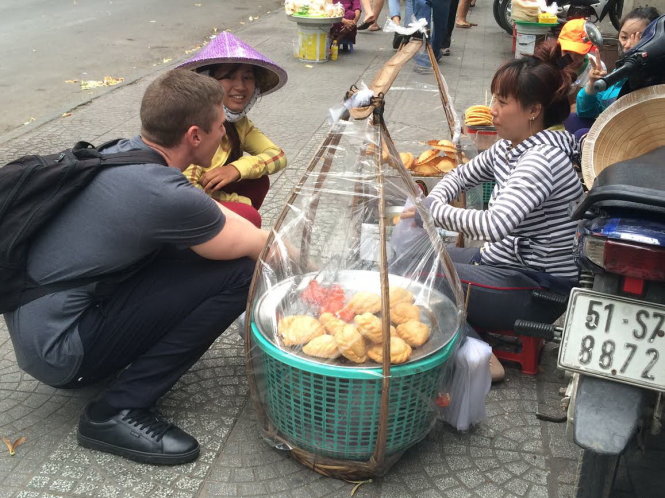While one tourism industry insider argued that street food may be the reason why fewer tourists return to Vietnam, many of Tuoi Tre News' foreign readership have addressed the issue emphatically.
Nguyen Phu, a former director of development with travel agency Peak Vietnam, has said most international visitors love the thought of experiencing Vietnamese street food, until they actually try it.
Phu said many of his guests had suffered from stomach problems after eating on the street, while others were shocked to witness the unhygienic practices of some Vietnamese street food vendors.
The writer, however, acknowledged that vendors were not to blame, suggesting that “street food is a legitimate feature of tourism that should be recognized and placed under proper management.”
Commenting on Tuoi Tre News’ Facebook page, some readers agreed with Phu’s experience of street food being associated with illness.
Russell Heaton said he once tried and ‘survived’ street food during his one-month stay in Vietnam, “but I wouldn't do it again,” he commented. “As much as I loved our stay in Vietnam, street food played no part in the attraction.”

Robbie Muller McMansbridge said that she had to give up on Vietnamese street food after a few weeks, as “regular bouts of diarrhea ensued.”
“Food is kept all day in glass display boxes […] vendors handle food and money with no gloves and yes, I also saw a dirty water bucket used for washing fruit,” she said.
Another reader with a forgettable experience of Vietnamese street food, Anthony D’Amato, said he suffered from food poisoning “usually once a year” during his seven years living in Vietnam. “I had it seven times [during] the first two years,” he wrote. “Something needs to be done.”
However, the number of commenters who believed Vietnamese street food was fantastic, and had little thing to do with poor tourist returns, seemed to outnumber those who agreed with Phu’s sentiment.
They love Vietnamese street food
Foreign readers were quick to assert that they loved street food, that they always ate on the street when they were in Vietnam, and that they had never been sick or known anyone to be so when eating Vietnamese street food.
“Street food is one of the things that brings me back to Vietnam year after year,” commenter Brian Dale wrote. “The street vendors are a great part of what makes Ho Chi Minh City so beautiful.”
Sharing the view, Terry Christopher Taft said that “street food is Vietnam.” The reader argued that “in this day and age, there is no reason for [street food] not to be clean,” and hailed the Vietnamese for their hygiene awareness.
“Vietnamese people are very clean by nature. They clean forks, knives and spoons, as well as chopsticks before they use them and rinse out their tea cups before drinking out of them,” he elaborated.
“I’ve been going to or staying in Vietnam since 2003 and I've rarely been sick from the food.”
 Food blogger Mark Wiens tries Vietnamese breakfast at a street eatery in Ho Chi Minh City in this file photo.
Food blogger Mark Wiens tries Vietnamese breakfast at a street eatery in Ho Chi Minh City in this file photo.
Vicky Sanders emphasized that street food was a must-do when in Vietnam. “Nothing better than sitting on a little red plastic seat eating with the locals,” she said. “Missing out if you only [eat] ‘clean’ restaurant food.”
George Allen, who believes street food is fantastic, argued that street food has no connection to poor tourism statistics.
“Anecdotal evidence that street food caused some tourists to become ill doesn't prove anything,” he said.
“How many people were influenced to visit Vietnam, in part, because of the street food?
“How many people returned to Vietnam despite having gotten sick?”
Let street food be street food
While many readers backed the idea that food safety and hygiene awareness should be improved for street food vendors, they do not think an organized zone for street food, as suggested by Phu, is a good idea.
“Putting street food into a designated zone where it can be overseen by hygiene inspectors and taxed by the government is a terrible idea,” Tom Lee argued.
“We come to Vietnam because we want to have the Vietnam experience.
“A big part of that is eating at an unregulated, family run food stall operating out of a house, bicycle or basket.
“It's what makes daily life in this country so wonderful.”

Another commenter, Ben Katchi, said that educating vendors on the importance of food hygiene would be a starting point, and one which would be beneficial in the long term.
Katchi, who claims to have never had any problems eating street food in Vietnam, recommended that instead of canceling street food tours, “companies, hotels or whoever is arranging [these packages] should go out and meet with the vendors themselves and discuss what needs to be done.”
Giving some simpler advice, Dffmnt Timothée suggested people “avoid the food which looks uncooked and everything will be fine.”
Still have something to add to this story? Send your opinions to ttn@tuoitre.com.vn.
Like us on Facebook or follow us on Twitter to get the latest news about Vietnam!



















































